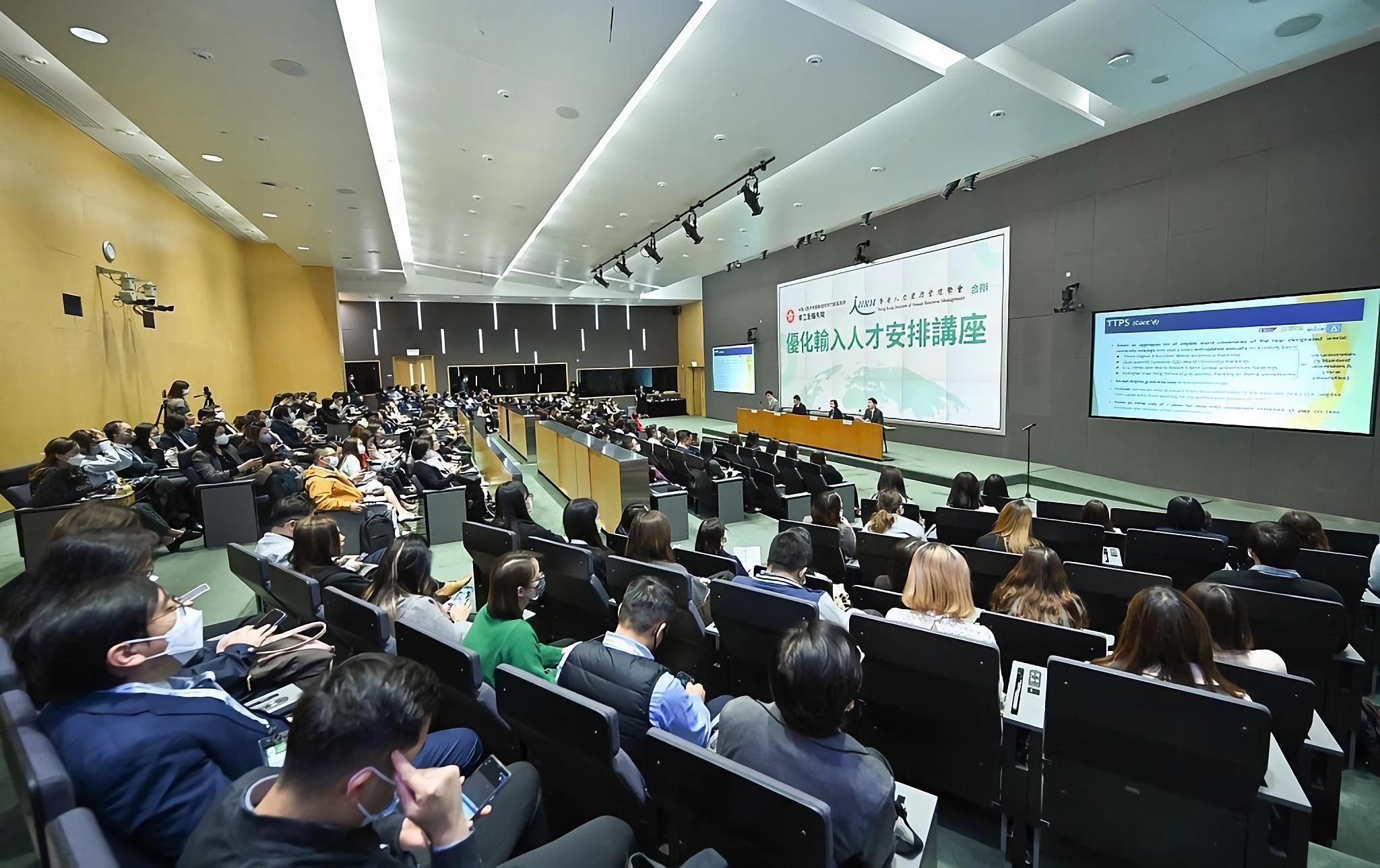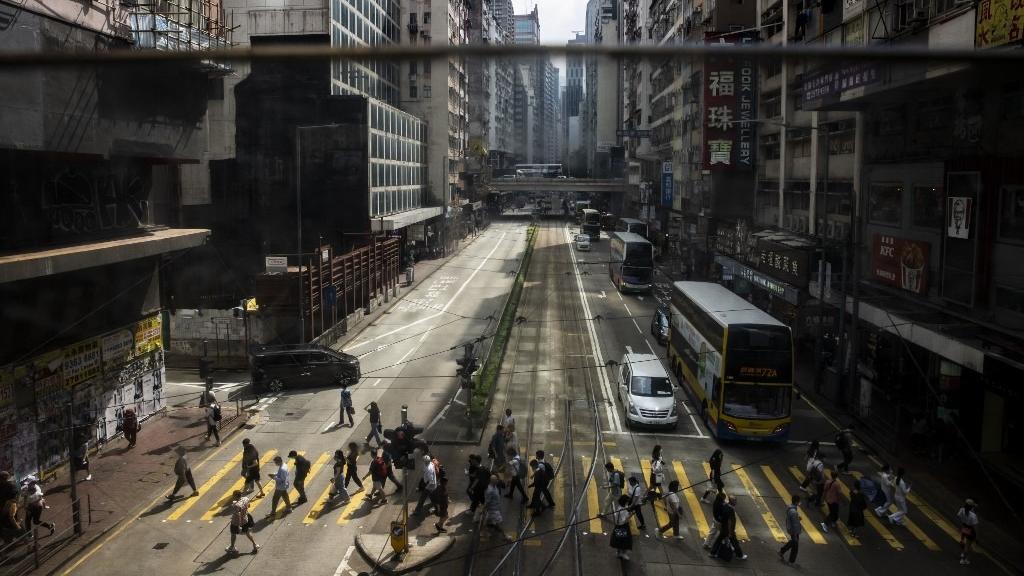Hong Kong is going the extra mile to deal with its shrinking workforce, with plans to import talents and nurture local young people to ease the shortage of skilled labor in certain sectors. William Xu reports from Hong Kong.
 A seminar was jointly held by the Labour and Welfare Bureau and the Hong Kong Institute of Human Resource Management in March to explain Hong Kong’s talent import programs. (PHOTO PROVIDED TO CHINA DAILY)
A seminar was jointly held by the Labour and Welfare Bureau and the Hong Kong Institute of Human Resource Management in March to explain Hong Kong’s talent import programs. (PHOTO PROVIDED TO CHINA DAILY)
Talent-hungry Hong Kong is pulling out all the stops to attract highly- skilled professionals from around the world to make the city more competitive in the long run and ease its labor crunch, with a ground-breaking move to import talents.
The ambitious approaches have won acclaim from local enterprises and experts who say the special administrative region still needs to go further. They have called for more supporting measures in areas like housing and education to retain talents and provide a stronger impetus for development.
In his maiden Policy Address in October last year, Chief Executive John Lee Ka-chiu vowed to get at least 35,000 skilled professionals worldwide annually to deal with the dire shortage of labor and ensure that the city remains competitive.
To attain these goals, the SAR government launched a Top Talent Pass Scheme aimed at enticing high-income individuals, as well as graduates from leading global universities.
The administration said on May 16 the number of professions on the Talent List will be expanded from 13 to 51, offering more opportunities for professionals to work in Hong Kong through three talent import programs — the Quality Migrant Admission Scheme, the General Employment Policy, and the Admission Scheme for Mainland Talents and Professionals
The TTPS, along with other programs to coax professionals to work in Hong Kong, had received about 84,000 applications as of May, according to Chief Secretary for Administration Eric Chan Kwok-ki.
So far, more than half of the applications have been approved — surpassing the government’s target of importing 35,000 talents a year.
The government is also optimizing six other talent programs introduced before the TTPS was launched. The administration said on May 16 the number of professions on the Talent List will be expanded from 13 to 51, offering more opportunities for professionals to work in Hong Kong through three talent import programs — the Quality Migrant Admission Scheme, the General Employment Policy, and the Admission Scheme for Mainland Talents and Professionals.
ALSO READ: Labor import: CE stresses ‘bigger pie’ for economic benefits
The new professions were added under nine industry segments, including business support, arts and culture, financial services, innovation and technology, and legal and dispute resolution services.
As of Dec 28, 2022, the Immigration Department had extended the length of stay for imported talents under various programs.
Applicants under the Immigration Arrangements for Non-local Graduates will first get a two-year visa if the Immigration Department approves their applications. They will receive three-year extensions on their first and second visa renewals. Previously, they were granted only a year’s stay on their applications and two years for the first and second renewals.
The government is also stepping up efforts to nurture local talents. In his 2023-24 Budget speech on Feb 22, Secretary for Finance Paul Chan Mo-po said the aim is to encourage diversified development among young people through education and training, and equip them with the skills that are vital for the city's high-quality development.
One of the key initiatives is to start a new financial technology internship program for post-secondary students to obtain working experience at fintech companies in Hong Kong and other cities of the Guangdong-Hong Kong-Macao Greater Bay Area, and help them develop an early interest in the sector after graduation.
 Pedestrians cross the street at the Causeway Bay district of Hong Kong on May 19, 2023. (PHOTO / AFP)
Pedestrians cross the street at the Causeway Bay district of Hong Kong on May 19, 2023. (PHOTO / AFP)
The government will further support and fund labor training programs in industries like insurance, logistics, maritime, aviation and construction, Chan said.
The government is also stepping up efforts to nurture local talents. In his 2023-24 Budget speech on Feb 22, Secretary for Finance Paul Chan Mo-po said the aim is to encourage diversified development among young people through education and training, and equip them with the skills that are vital for the city's high-quality development
Multipronged measures
Besides the long-term plan to bring in talents and nurture local young people, the government has decided to import labor to cope with shortages in the skilled workforce.
The SAR’s labor force had shrunk from 3.68 million in 2018 to 3.46 million in 2022, with the number of low-skilled workers having decreased by about 160,000, it was revealed last month. A survey conducted by the Hong Kong General Chamber of Commerce in April also showed that 74 percent of local employers were facing talent shortages.
ALSO READ: Hong Kong to import 20,000 workers to ease labor woes
The government announced on June 13 a new labor import plan aimed at easing severe manpower shortages in the construction and transportation industries.
Under the plan, up to 20,000 workers will be imported from this month, with 12,000 allocated to the construction sector, 6,300 to the aviation industry, and 1,700 to the public light bus and coach sector.
Various business sectors have also been exploring short-term exchange programs with their counterparts on the Chinese mainland since the full resumption of travel between Hong Kong and the mainland in February. The Hospital Authority has begun a Greater Bay Area healthcare talents visiting program, which brought in the first batch of exchange doctors, nurses and traditional Chinese medicine experts from the mainland in April.
The SAR government’s efforts to address the talent shortage have received positive feedback from experts and enterprises. However, they have called for further steps to help imported talents settle down in the city, and make it easier for local young people to upgrade their expertise and seek greater development opportunities in Hong Kong.
Chow Man-kong, a lawmaker and associate vice-president of the Education University of Hong Kong, said it is important to create an environment that is conducive to developing talent.
The SAR government’s efforts to address the talent shortage have received positive feedback from experts and enterprises. However, they have called for further steps to help imported talents settle down in the city, and make it easier for local young people to upgrade their expertise and seek greater development opportunities in Hong Kong
He cited a survey by a local think tank which showed that about 60 percent of mainland people with work permits in Hong Kong did not plan to stay for more than five years, with the poor living environment being the main reason for their decision.
He urged the government to build apartments to be exclusively rented to imported professionals, reducing their living costs and improving their housing conditions.
READ MORE: HK labor groups appeal to prioritize local workers' benefits
Hsu Hoi-shan, president of the Beijing-Hong Kong Academic Exchange Center, said the government should use more resources to accelerate the development of local young people.
The administration should further improve its support policy for science and innovation, and create a favorable environment and promising prospects for professionals. With adequate opportunities and support for young people to display their talent, they would be more willing to stay in Hong Kong and contribute to its development, he said.
Andrew Yao Cho-fai, chairman of Hong Kong Shanghai Alliance Holdings, noted there are many overseas talents already working in Hong Kong. If they are allowed to go to other cities in the Greater Bay Area without having to apply for visas or entry permits, they will visit the mainland more frequently, boosting cross-boundary economic and scientific cooperation, he said.
Mike Gu and Mike Wong contributed to this story.
Contact the writers at williamxu@chinadailyhk.com


